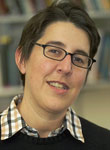Villarejo says TV distorts our perception of time
By Linda B. Glaser

When is an hour not 60 minutes long? When it's an hour of television, Amy Villarejo quipped in a July 9 lecture that illuminated the impact television viewing has on our perceptions of time.
Villarejo, a professor of film and of feminist, gender and sexuality studies and chair of the Department of Performing and Media Arts, sees television as an extension of photography and cinematography, but with a fundamental difference.
In her lecture, "On Television: Duration, Endurance, Ethereality," she explained to a filled Hollis E. Cornell Auditorium that "we freely give our time to television, which extracts value from our mere capacity to pay attention, and television in turn synchronizes us to its socialization. It inserts us into the time slot its grid. It is the implantation of social time."
In describing the experience of time, Villarejo discussed recent endurance pieces in both theater and cinema, where audiences are subjected to what Villarejo calls "extreme temporal experiences."
One example: Artist Christian Marclay's "The Clock," a 24-hour video installation comprised of roughly 10,000 clips in which images of time are synchronized with the actual time of projection. If the on-screen watch reads 4:25, it is 4:25 when the viewer sees it. She noted that "The Clock" unfolds in real time in a way that "mimics television's flow but that does not in any way capture the complexities of televisual time or its experience."
Quoting the French philosopher Bernard Steigler, Villarejo said that when watching an hour of television or film, "52 minutes of our life will have passed outside of our real life, in a life or in the lives of the characters, real or fictional, whose time we will have made our own."
Essentially the viewer adopts the reality on screen, merging with the images. This watching, she explained, triggers a mechanism through which the spectator's consciousness adopts the film's time as its own, and is "captured and borne along by the movement of images."
With recordings, we can hear and see a moment in time -- the same moment in time -- over and over again. Villarejo pointed out that this affects the workings of memory. "As an editing process, consciousness works by the contraction, condensation and abbreviation of time -- memory is always a process of forgetting," Villarejo said.
Although recordings seen on television are clearly from the past, they are experienced in the present, which has blurred the distinctions between past and present, Villarejo said. In both television and cinema, "the past and the present are radically reconfigured in relation to being and action ... we must learn anew to distinguish our ordinary senses of past and present, being and becoming."
Villarejo's lecture was part of the School of Criticism and Theory's public lecture series and was drawn from her forthcoming book "Ethereal Queer," to be published in 2013 by Duke University Press.
Linda B. Glaser is staff writer for the College of Arts and Sciences.
Media Contact
Get Cornell news delivered right to your inbox.
Subscribe